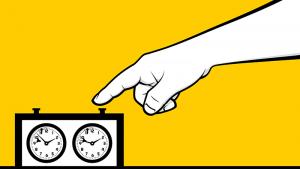
The Double Attack
The double attack is a devastating tactical weapon.
A double attack can come out of nowhere, instantly winning the game in a complex position. Combinations and tactical shots are usually made possible by a certain aspect of the position -- a vulnerable king, for instance.
But even top-level grandmasters have fallen prey to remarkably straightforward double attacks precisely because they seem to arise out of thin air.
But in fact, they do not! In his excellent work Secrets of Practical Chess, GM John Nunn coined the acronym LPDO: Loose Pieces Drop Off.
The vast majority of double-attack blunders can be prevented by identifying and keeping an eye on undefended pieces.
Any unanchored piece in your camp must set off a red flag. Before placing a second piece on an undefended square, you must carefully check -- and continue checking as long as the pieces remain undefended -- for double attacks.

The following famous (or rather infamous) game is a brilliant illustration of LPDO. Even world champions are not immune to double attacks!
Because the position was so calm, apparently devoid of tactical possibilities, Karpov probably played 11...Bd6 without a great deal of thought. But the LPDO check should be conducted regardless of the position.
A weak king most certainly counts as an undefended piece. If your opponent has the possibility of creating a mate threat, even if your king is not under attack, the LPDO monitor should immediately be switched on. Indeed, double attacks involving the king are even more devastating, since mate must be prevented at all costs.
It was certainly not my opponent's day -- David is an excellent tactician, having crushed several strong grandmasters in wild tactical battles -- but the LPDO check will enable you to avoid double-attack blunders regardless of the form you are in.
While most double attacks are straightforward, some are hard to see because they target a pawn or piece that appears to be defended. To this end, a second acronym: WPDO (Weak Pieces Drop Off), can prove quite helpful.
When your position is hanging by a thread, you should pay close attention to its weakest points, even if they are defended.
As I have mentioned before, the occasional blunder is unavoidable. Our mind is not a machine, and it is impossible to develop an algorithm for avoiding tactical errors 100 percent of the time.
But most blunders stem from tactical unawareness -- an inability to identify a potential trigger.
With the vast majority of double attacks, these triggers can be easily identified -- and a tragic blunder avoided -- using the LPDO check.
RELATED STUDY MATERIAL
- Read GM Naroditsky's last article, How To Break Fortresses.
- Watch FM Elliot Liu's video on how to use double attacks to break through on the kingside.
- Take a lesson on double attacks in the Chess Mentor.
- Practice your tactics in the Tactics Trainer.
- Looking for articles with deeper analysis? Try our magazine: The Master's Bulletin.






